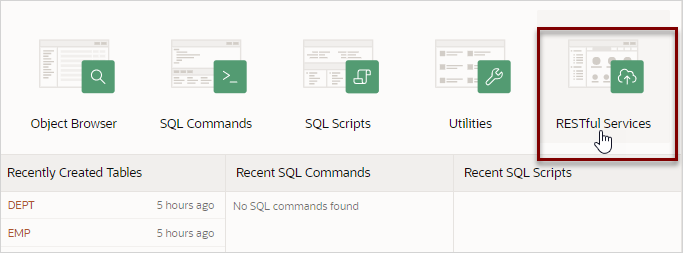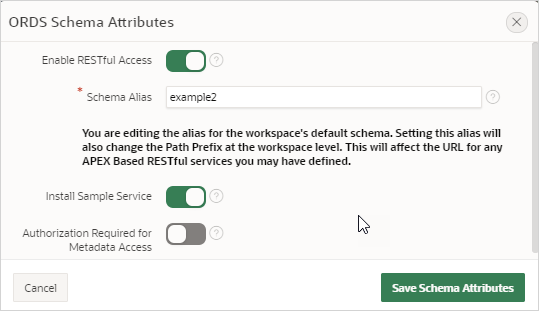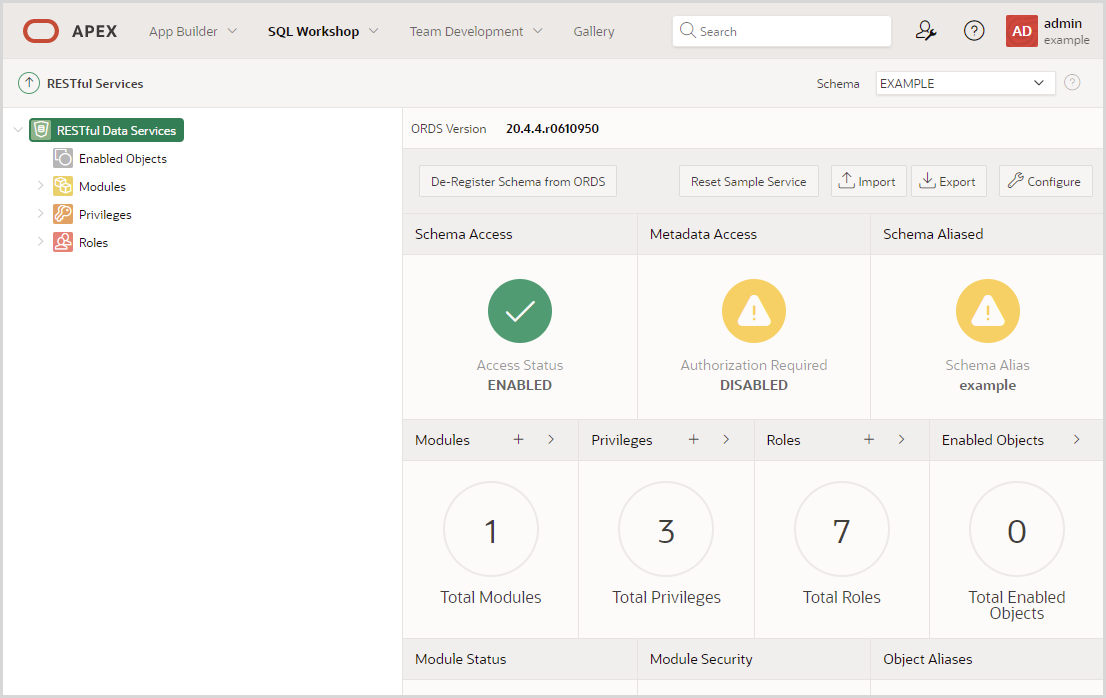7.4 How to Access RESTful Services
Access RESTful Services from SQL Workshop.
- Accessing RESTful Services
Access RESTful Services from the Workspace home page by clicking SQL Workshop and then RESTful Services. - Registering Schema with ORDS
If you are accessing ORDS Restful Services in a new workspace, you must register the schema with ORDS RESTful Data Services. - About ORDS RESTful Services Dashboard
Learn about ORDS RESTful Services dashboard.
Parent topic: Enabling Data Exchange with RESTful Services
7.4.1 Accessing RESTful Services
Access RESTful Services from the Workspace home page by clicking SQL Workshop and then RESTful Services.
To access RESTful Services:
See Also:
Parent topic: How to Access RESTful Services
7.4.2 Registering Schema with ORDS
If you are accessing ORDS Restful Services in a new workspace, you must register the schema with ORDS RESTful Data Services.
To register a schema with ORDS RESTful Data Services:
Parent topic: How to Access RESTful Services
7.4.3 About ORDS RESTful Services Dashboard
Learn about ORDS RESTful Services dashboard.
Upon registering the schema with ORDS, the ORDS RESTful Services dashboard page appears displaying the ORDS version.
Table 7-1 ORDS RESTful Services Dashboard Parameters
| Name | Description |
|---|---|
|
ORDS Version |
Version of ORDS. |
|
De- Register Schema from ORDS |
Click to de-register schema. |
|
Reset Sample Service |
Click to reset the installed sample service. Note: Reset Sample Service Verification dialog appears warning the user that the service will be completely deleted and re-created. |
|
Import |
Click to import ORDS based RESTful service definitions from a SQL script generated by SQL Developer or Oracle APEX. |
|
Export |
Click to export ORDS based RESTful Service metadata to SQL script file format. Note: If you are running ORDS 18.3 or later , dipalys the Include Enable Schema and Include Privilages fields. Include Enable Schema - (Default: Enabled) This dictates whether the resulting export script contains Include Privileges - (Default: Enabled) This dictates whether the resulting export script contains the privilege definitions associated with the chosen module(s). (includes protected module, roles, and resource patterns) |
|
Configure |
Click to configure ORDS schema attributes. Note: ORDS Enabling a schema that is assigned to more than one workspace as the default schema causes issues with workspace related static files. Oracle recommends that you do not ORDS enable schemas shared amongst multiple workpaces until you are running ORDS 18.3 or higher. |
|
Schema Access |
Displays whether access to the RESTful services defined within the schema is enabled or disabled. |
|
Metadata Access |
Displays whether Oracle REST Data Services should require user authorization before allowing access to the ORDS metadata catalog of this schema. |
|
Schema Aliased |
Displays alias name for the current schema. |
|
Modules |
Displays total number of modules defined within the schema. Click to view list of defined modules. |
|
Privileges |
Displays total number of privileges defined. Click to view list of defined privileges. |
|
Roles |
Displays total number of roles associated. Click to view the associated roles. |
|
Enabled Objects |
Displays the total number of REST enabled database objects in the schema. Click to view list of REST enabled objects. |
|
Module Status |
Displays the status of published and unpublished modules. |
|
Module Security |
Displays the status of protected and unprotected modules. |
|
Object Aliases |
Displays the status of Aliased and Unaliased objects. |
Parent topic: How to Access RESTful Services



